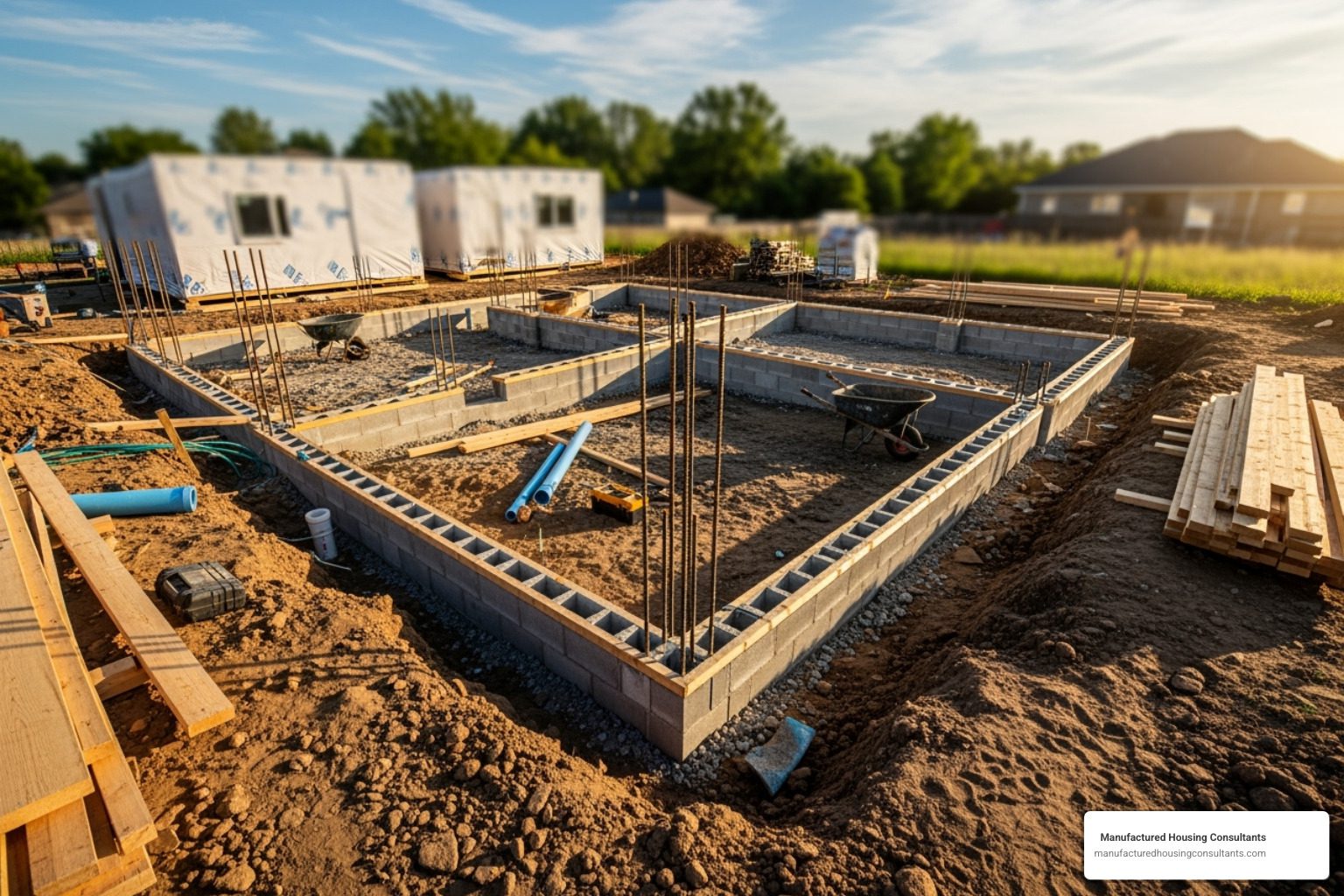Why Foundation Choice Matters for Your Texas Modular Home
Modular home foundation types determine your home’s long-term stability, energy efficiency, and resale value. Unlike manufactured homes, which can use temporary foundations, modular homes require permanent foundations meeting the same building codes as site-built homes.
Quick Answer: The main modular home foundation types are:
- Crawl Space Foundation – Most popular; 48-inch space underneath for utilities, pest protection, and thermal benefits
- Basement Foundation – Most expensive but adds living space and storm protection; great for sloped lots
- Pier and Beam Foundation – Best for flood-prone areas and uneven terrain; lifts home for airflow
Your foundation choice affects everything from energy bills to financing options. In Texas, where soil ranges from expansive clay to sandy coastal areas, picking the right foundation can save you thousands in future repairs.
The stakes are high, as foundations can account for up to a third of your construction cost—often $50,000 to $200,000 for modular homes. Understanding your options helps you make a smart choice that fits your budget and protects your investment for decades.
At Manufactured Housing Consultants, we’ve helped Texas families make these decisions across our service areas, from the clay soils of East Texas to the coastal plains near Houston. While we don’t perform the foundation construction or site work ourselves, we guide you through selecting the right type and coordinating with qualified local contractors. Let’s break down each foundation type so you can choose the best base for your new modular home.
Important modular home foundation types terms:
An In-Depth Look at Modular Home Foundation Types
Choosing the right foundation for your modular home in Texas isn’t just about what looks good on paper—it’s about finding the perfect match for your land, budget, and long-term plans. Let’s explore the three main modular home foundation types and see which one might be calling your name.
Crawl Space Foundations: The Popular & Practical Choice
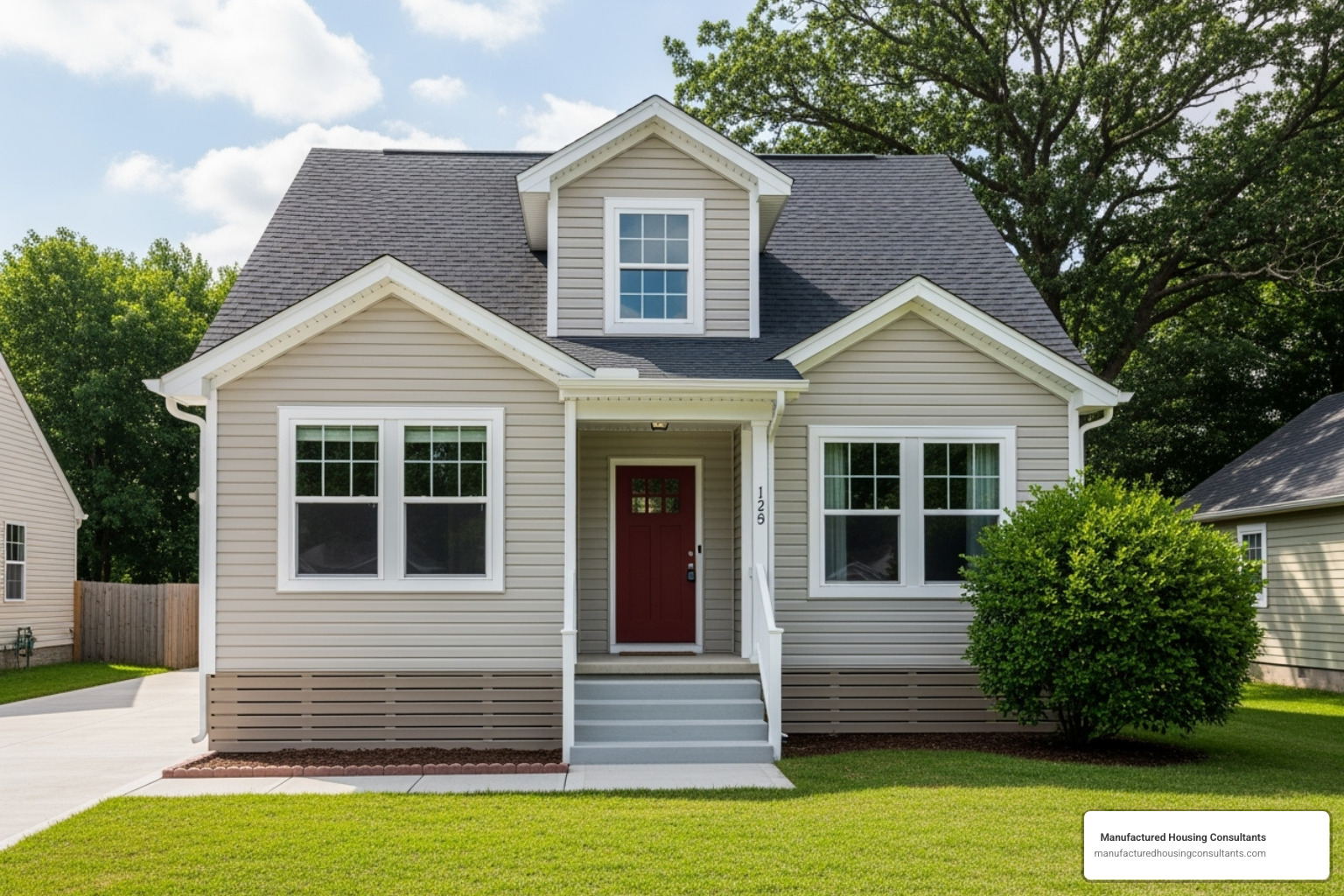
Crawl space foundations are the “Goldilocks” option—not too expensive, not too basic, but just right for most Texas families. This foundation creates a 48-inch enclosed space between your home and the ground, supported by poured concrete walls and footers for rock-solid stability.
Many of our San Antonio and New Braunfels customers love crawl spaces because they make utility access a breeze. Fixing a plumbing issue or adding electrical work is simple, as everything is easy to reach.
The cost sits in a sweet spot between $5,000 and $10,000, making it budget-friendly. When properly insulated, crawl spaces can also slash your energy bills by up to 10%, which is real money back in your pocket during brutal Texas summers.
The thermal benefits are impressive too. The crawl space acts as a buffer zone, keeping your floors warmer in winter and cooler in summer. For families in our service areas from Victoria to the Hill Country, this means year-round comfort.
But there are challenges. Moisture can be an issue if your crawl space isn’t properly sealed and ventilated. Given Texas humidity, you’ll need a good vapor barrier. Regular pest inspections are also smart, as some critters might try to move in. While we can recommend trusted local professionals for these services, they are typically managed directly by the homeowner.
Crawl spaces handle our varied soil conditions well, from the clay soils around San Antonio to sandier coastal areas. They’re also perfect for slightly sloped lots, saving you money on excavation.
To get the most from your crawl space, make sure it’s properly insulated and sealed. Keep vents clear and don’t skip regular inspections.
More info about modern modular housing.
Basement Foundations: Maximizing Space and Value
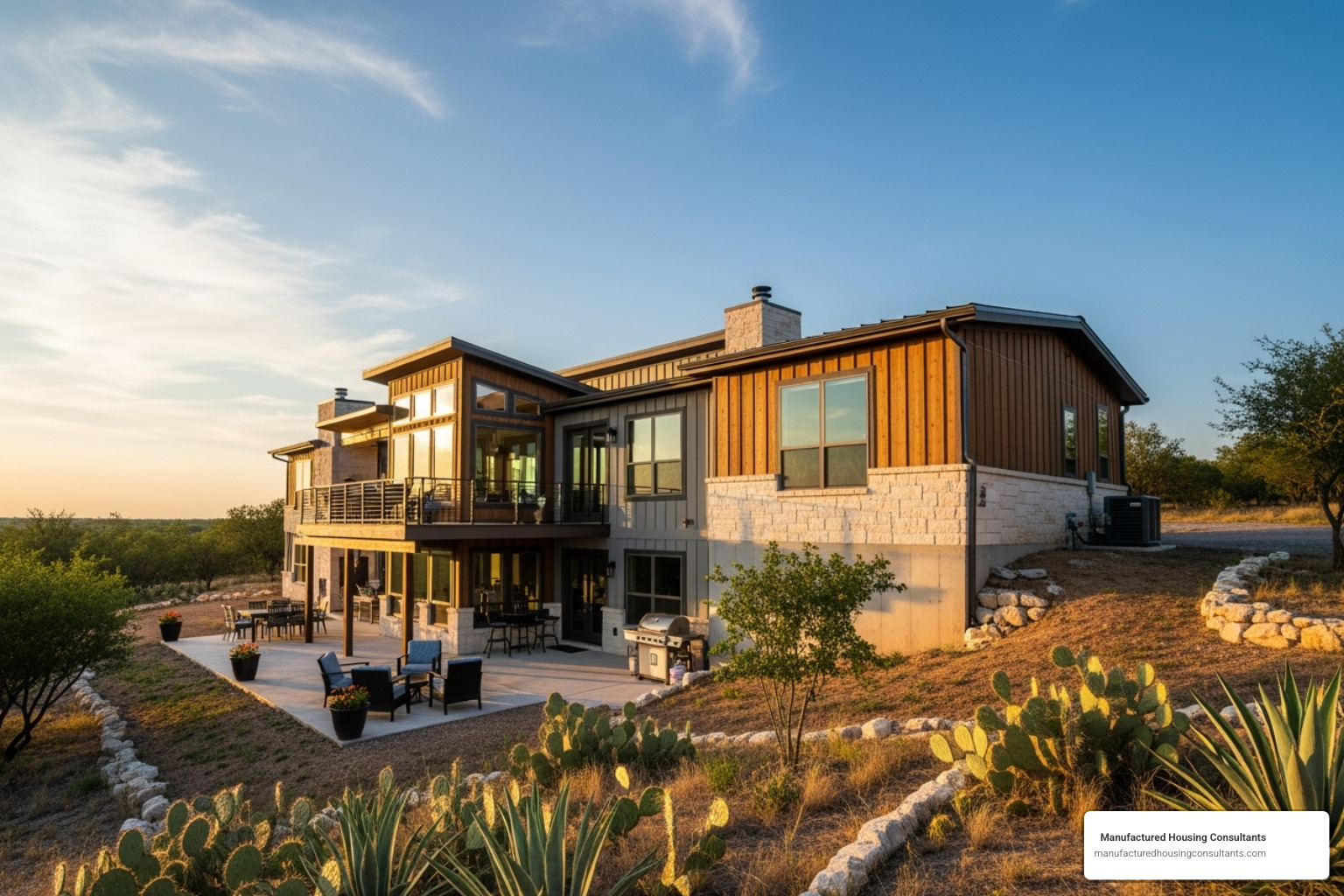
If you’re thinking long-term value, basement foundations are a great choice. This foundation type literally doubles your usable space by creating a full-height room beneath your home.
The space possibilities are endless. Finish it as extra bedrooms, a home office, or a recreation room. It’s important to note that while we help you plan for a basement, the interior finishing is a separate project that you would coordinate with a general contractor.
For Texas weather, basements are like a personal storm shelter. When severe weather rolls through, you have a safe, protected space right under your feet. That peace of mind is priceless.
The financial benefits are real. Basements typically increase your home’s resale value significantly, providing a strong return on investment. The earth-sheltered design can also reduce heating costs by up to 15%.
Basements really shine on sloped lots in Texas. If you’re building in the Hill Country near New Braunfels or on rolling land around San Antonio, a walk-out basement can save money on excavation while creating stunning curb appeal.
Now for the reality check—basements are the priciest option, typically running $20,000 to $30,000 or more. The excavation is extensive, and you’ll need proper waterproofing and drainage. The timeline is also longer, as it must be built and inspected before your modular home is set.
When does a basement make sense? If you need the extra space, are building on a sloped lot, or want maximum long-term value and can handle the upfront investment.
What are Modular Home Foundations?
Pier and Beam Foundations: Adaptable and Lifted
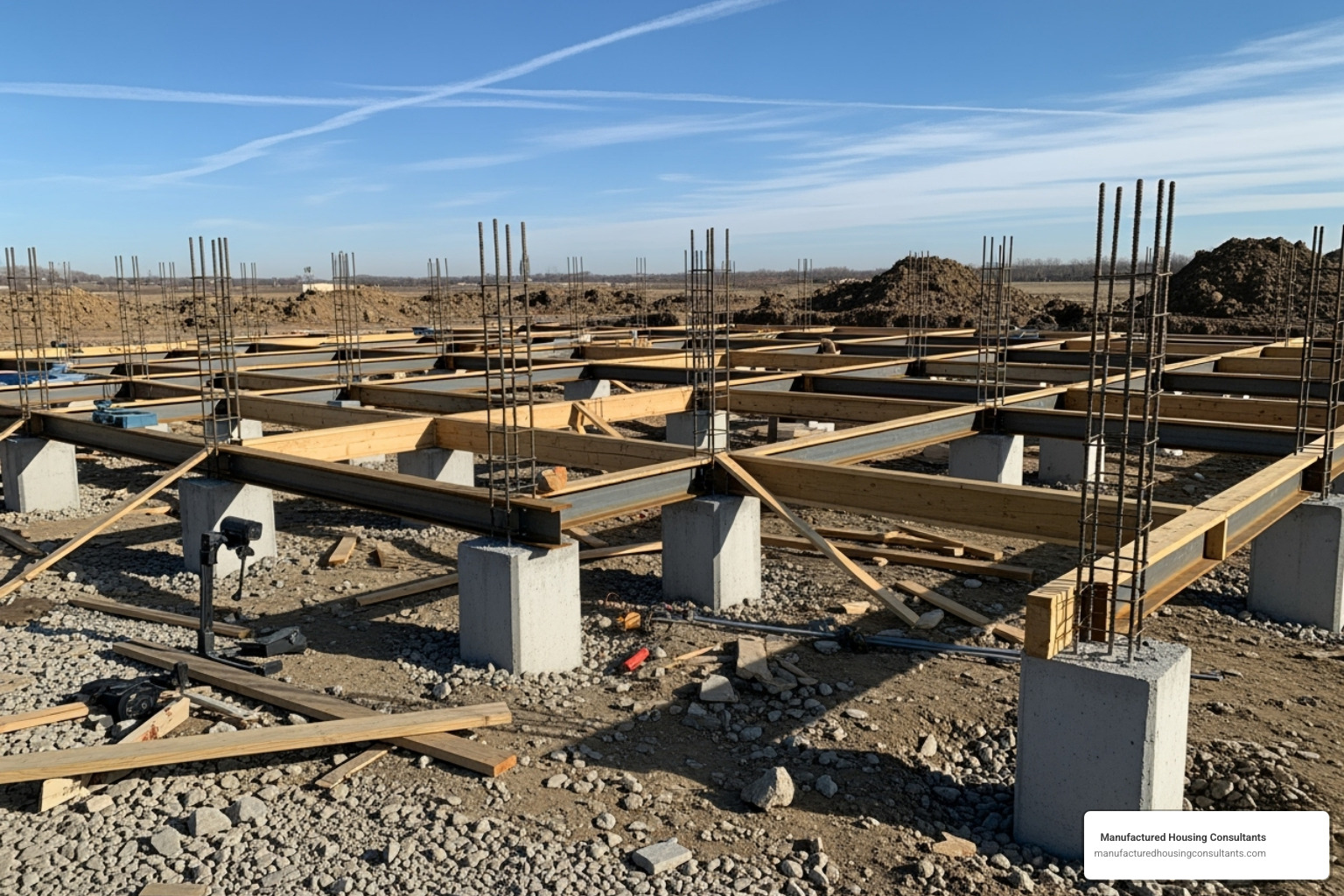
Pier and beam foundations lift your modular home on a network of concrete piers and beams. For modular homes, this must be a permanent, engineered system that meets all local building codes, complete with proper anchoring and often a perimeter wall.
This foundation type is a flood-fighter’s dream. By elevating your home, water flows harmlessly underneath. If you’re building near the Texas coast or in a flood-prone area, this feature alone could save you thousands.
The airflow benefits are fantastic in our humid Texas climate. The open space helps prevent moisture buildup and keeps things ventilated. Like crawl spaces, you also get easy access to utilities.
Pier and beam foundations are incredibly adaptable to challenging terrain like a sloping lot or uneven ground. They adjust to the landscape without requiring massive excavation, which can save money on site preparation.
An exciting innovation is helical screw piles. These steel shafts screw deep into the ground, offering superior stability and lasting over 150 years. While Manufactured Housing Consultants does not install these systems, we can help you determine if they are a good fit for your property and connect you with specialists in the San Antonio or Houston areas. They install quickly and are perfect for soft or challenging soil.
The challenges are real. An engineered pier and beam system for modular homes typically runs $10,000 to $20,000 or more. Without proper insulation and skirting, energy efficiency can suffer, and it needs regular maintenance for stability.
For our customers along the Texas coast or in areas with high water tables, pier and beam foundations are often the obvious choice due to their flood protection and adaptability.
At Manufactured Housing Consultants, we help families across our Texas service areas steer these decisions based on their specific land and goals. Our expertise lies in consulting and project coordination, ensuring you partner with the right experts for tasks like excavation and foundation installation.
What are Modular Home Foundations?
Making the Right Choice for Your Texas Home
Choosing a foundation involves more than just picking a type; it’s about matching the foundation to your specific land, budget, and long-term goals. Here’s how to make an informed decision for your Texas modular home.
Special Considerations for Modular Home Foundation Types in Texas
Texas is a vast state with diverse geography, so what works in one region might not be ideal in another. Understanding these local factors is crucial when selecting your modular home foundation types.
From our experience helping families across Texas, we’ve seen how dramatically soil conditions can vary. In San Antonio and New Braunfels, we deal with expansive clay soils that can wreak havoc on poor foundations. This clay swells when wet and shrinks when dry, creating pressure that can crack concrete.
Meanwhile, coastal areas near Victoria face different challenges. Here, sandy soils drain well but offer less bearing capacity, and flood risk is a major consideration. What works in the Hill Country might be a poor choice near the Gulf Coast.
| Factor | Crawl Space | Basement | Pier and Beam |
|---|---|---|---|
| Texas Soil Type | Good for most, but needs vapor barrier on expansive clay (e.g., San Antonio) | Excellent for stable soils; can be challenging on highly expansive clay | Adaptable to varied soils, including unstable or sloped (e.g., Hill Country) |
| Climate Zone | Versatile; good insulation in all climates | Excellent thermal performance in all climates, especially cold (rare in TX) | Great for humid/wet climates, flood zones (e.g., Coastal Texas) |
| Flood Risk | Moderate protection, can be lifted | Good protection if properly waterproofed; can be prone to flooding if below grade | Excellent flood protection due to elevation (e.g., Corpus Christi, Houston) |
| Cost | Middle range ($5k-$10k) | Highest ($20k-$30k+, often including site work) | Mid to high range ($10k-$20k+ for permanent modular) |
Climate considerations also play a huge role. While Texas doesn’t have deep frost lines, foundations must be set below the frost line to prevent damage. In humid coastal regions, proper ventilation is critical, which is why lifted foundations perform so well near the Gulf.
Local building codes add another layer of complexity. All modular home foundation types must meet local and state requirements, often based on the International Residential Code. What’s approved in one county might differ in another, which is why working with experienced local professionals is key.
Soil testing is absolutely critical and can prevent up to 70% of foundation failures. A geotechnical engineer analyzes your soil and recommends the appropriate foundation design. This is a service we strongly advise, and while we don’t perform the geotechnical analysis ourselves, we require it for many projects and can connect our clients in the San Antonio area and beyond with certified engineers to ensure your foundation is built to last.
FEMA guidance on building codes
Difference between modular and manufactured homes
Understanding Costs for Different Modular Home Foundation Types
Foundation costs represent a significant chunk of your home building budget. You’re not just paying for concrete and rebar, but also for excavation, engineering, specialized treatments, and extensive site preparation.
Basement foundations consistently top the cost charts, often running $20,000 to $30,000 or more. However, they also add an entire floor of usable space, which significantly boosts resale value.
Crawl space foundations hit the middle ground, typically ranging from $5,000 to $10,000. They offer good utility access and thermal benefits without breaking the bank.
Pier and beam foundations for modular homes fall into the $10,000 to $20,000 range. The engineering for permanent modular installations pushes costs higher than for manufactured homes, but the flood protection often justifies the investment.
When we look at the total foundation package—including site prep, utilities, and drainage—Texas families typically invest between $50,000 and $200,000. This wide range reflects that every property is different.
Several factors drive these costs. Lot preparation can be a major expense on sloped or wooded properties, with clearing and grading costs ranging from a few thousand to $20,000 or more. It’s important for our clients to understand that these site preparation services are not performed by Manufactured Housing Consultants; we help you budget for them and find qualified local contractors to execute the work.
Soil conditions dramatically impact costs. Challenging expansive clay soils require deeper foundations and better drainage, which can double the cost compared to stable soil.
Accessibility also matters. If your property is down a narrow road where large equipment can’t easily reach, expect higher labor costs.
The good news is that understanding these variables helps you budget effectively. At Manufactured Housing Consultants, we walk you through every potential cost so there are no surprises.
Permanent Foundations, HUD Rules, and Financing
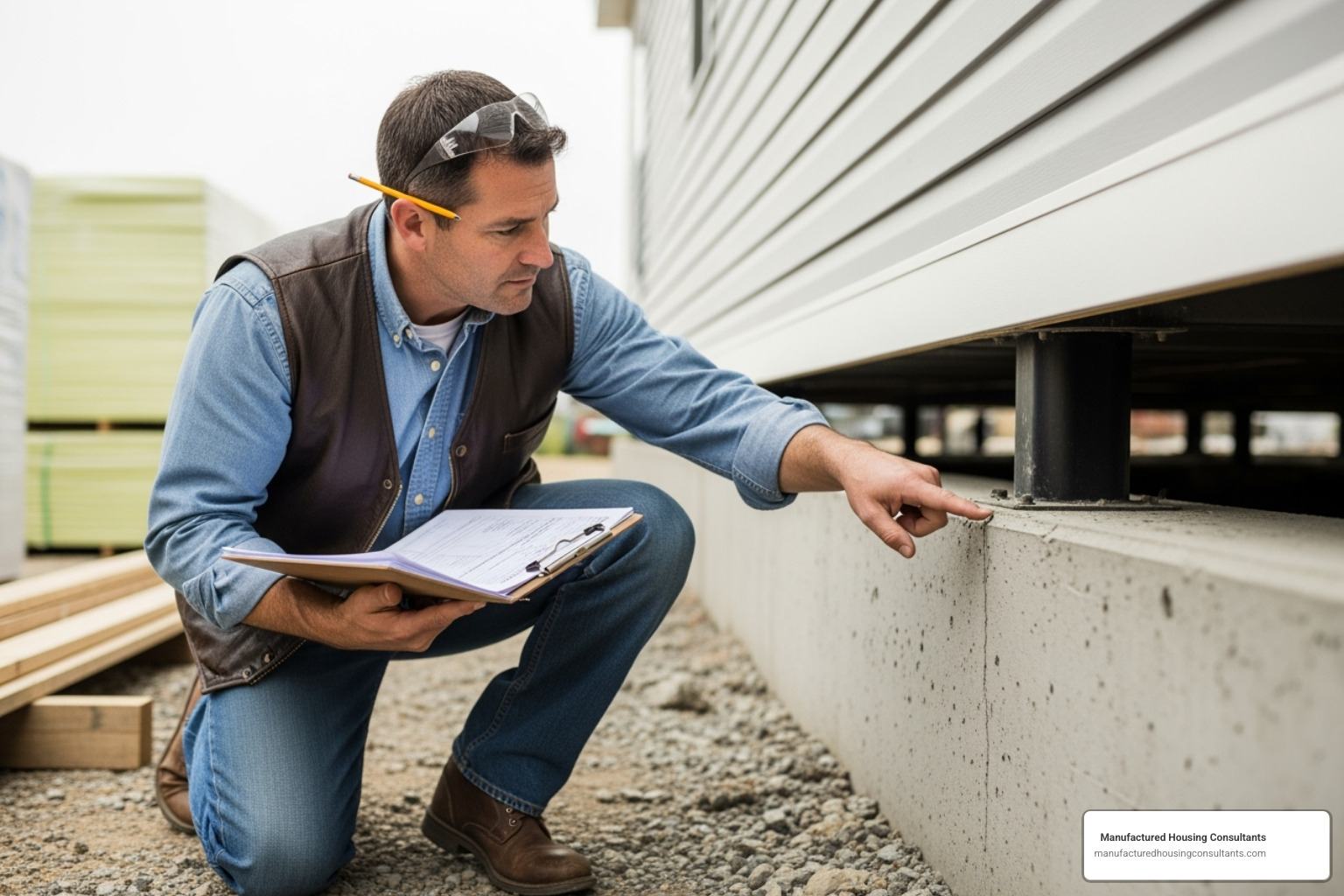
This is where modular homes really shine, a distinction that can save you thousands in financing and boost your home’s long-term value.
Modular homes must be installed on permanent foundations. They’re built to the same local and state building codes as site-built homes, which means permanent foundations of durable materials like concrete or engineered lumber. These foundations securely anchor the home to the ground.
This requirement is a huge advantage. Permanent foundations make your modular home “real property” that appreciates in value just like traditional homes. We’ve seen modular homes in San Antonio and New Braunfels appreciate at rates comparable to stick-built construction because of this.
Financing becomes much simpler with permanent foundations. Your modular home qualifies for the same loan programs as traditional homes: conventional mortgages, FHA loans, VA loans, and USDA loans.
FHA loans are popular among our Texas clients. Since modular homes already meet building codes and sit on permanent foundations, they typically qualify without the extra requirements that manufactured homes face.
VA loans work the same way for eligible veterans. The permanent foundation requirement is automatically met, streamlining the approval process.
The impact on resale value can’t be overstated. A basement adds significant square footage and market value, but even crawl space and pier foundations contribute to better resale prospects.
Financing terms are also typically better for homes on permanent foundations. You’ll often qualify for longer loan terms, lower interest rates, and smaller down payments.
At Manufactured Housing Consultants, we help steer all these financing options, regardless of your credit situation. We work with lenders who understand the Texas modular home market. To be clear, we are not a direct lender, but our experience and relationships in the Texas market allow us to effectively guide you to the best financing partners for your situation.
HUD requirements for permanent foundations
Find Modular Home Financing Options
Find out what type of home is best for you

